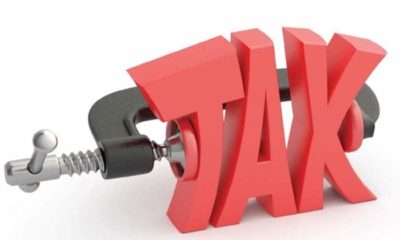The federal government of Nigeria has mandated digital Non-Resident Companies (NRC) to remit 6 percent tax on income generated from digital services rendered to Nigerian customers.
Non-resident companies can be defined as companies or entities that are not registered or incorporated in Nigeria but derives income or profits from Nigeria. These include Amazon, AliExpress, Twitter, Zoom Inc. and others.
At the public presentation of the 2022 approved budget held at Abuja on Wednesday, the minister of finance, budget and national planning, Ahmed Zainab revealed that the new tax policy has been included in the Finance Act signed into law on the last day of 2021 by the President Muhammadu Buhari.
The Finance Act empowers the Federal Inland Revenue Service (FIRS) to assess Company Income Tax (CIT) on the turnover of foreign digital companies involved in transmitting, emitting, or receiving signals, sounds, messages, images, or data of any kind including e-commerce, app stores, and online adverts. Also, Non-residents making taxable supplies to recipients in Nigeria have the primary obligation to charge, collect and remit VAT to FIRS.
The minister affirmed that section 4 of the Act made provisions for the taxation of e-commerce businesses by non-resident companies on a fair and reasonable turnover basis of 6 percent.
Ahmed said, “this provision empowers FIRS to access non-resident firms to tax on Fair and Reasonable Turnover Tax Basis on turnover earned from digital services provided to Nigerian customers. The rationale for this is to modernize the taxation of ICT and digital economy in line with current realities, and this is in conformity with the provisions of the national development plan of 2021.”
she added that “such digital services include apps, high-frequency trading, electronic data storage, online advertising and several others.”
According to the Finance Act, the digital Non-Resident companies are obliged, to collect VAT from their Nigerian customers and remit to the FIRS.
Ahmed further explained that “the mechanism that will be used is to restrict VAT obligations mainly to digital non-resident companies who supply individuals in Nigeria, who cannot themselves self-account for VAT.
“If you visit Amazon, we are expecting Amazon to add a VAT charge to whatever transaction you are paying. I am using Amazon as an example. We are going to be working with Amazon to agree to be registered as a tax agent for the FIRS. So Amazon will now collect this payment and remit it to FIRS, and this is in line with global best practices. We have been missing out on these revenue streams.”
Discussing non-resident taxpayers, Ahmed said the Finance Act puts into consideration reducing tax compliance orders on non-resident taxpayers who are not required to register for VAT in Nigeria.
“So they don’t really have to come and be registered companies in Nigeria. All they need is that arrangement with FIRS where they collect VAT on behalf of FIRS and remit to FIRS.
“And also, to clarify, that FIRS may appoint persons including non-resident companies for the purpose of VAT collection and to clarify again that appointed persons may collect and remit taxes to FIRS, pursuant to the relevant tax laws.
“The core rationale for this is to modernise the taxation of ICT and digital economy in line with the National Development Plan 2021-2025, to enhance administrative modalities for the taxation of non-resident taxpayers and also to reduce incompliance by non-resident payers to reduce the compliance burden.” She said.
According to the PWC Nigeria report, Nigeria’s Finance Bill 2021 seeks to amend 12 different laws, that become effective in the Year 2022. They are;
- Capital Gains Tax Act (CGTA)
- Companies Income Tax Act (CITA)
- Federal Inland Revenue Service (Establishment) Act [FIRSEA]
- Personal Income Tax Act (PITA)
- Stamp Duties Act (SDA)
- Tertiary Education Trust Fund (Establishment) Act [TETFEA]
- Value Added Tax Act (VATA)
- Insurance Act
- Nigerian Police Trust Fund (Establishment) Act [NPTFEA]
- National Agency for Science and Engineering Infrastructure Act (NASENI Act)
- Finance (Control and Management) Act [FCMA], and
- Fiscal Responsibility Act (FRA)


 Naira4 weeks ago
Naira4 weeks ago
 Naira4 weeks ago
Naira4 weeks ago


 Naira4 weeks ago
Naira4 weeks ago




 Naira3 weeks ago
Naira3 weeks ago
 Commodities4 weeks ago
Commodities4 weeks ago


 News4 weeks ago
News4 weeks ago


 Banking Sector4 weeks ago
Banking Sector4 weeks ago
 Travel4 weeks ago
Travel4 weeks ago




















